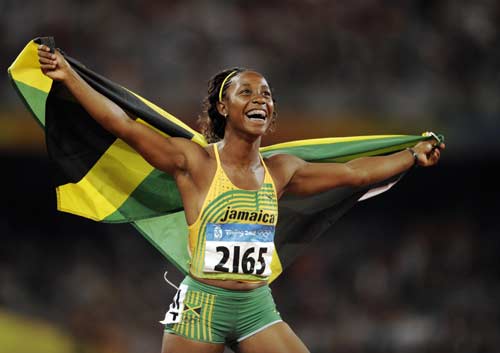Sprinting in the blood of Jamaica's champions
Be it the school races, the yams or the reggae, the island has always punched above its weight.

Your support helps us to tell the story
From reproductive rights to climate change to Big Tech, The Independent is on the ground when the story is developing. Whether it's investigating the financials of Elon Musk's pro-Trump PAC or producing our latest documentary, 'The A Word', which shines a light on the American women fighting for reproductive rights, we know how important it is to parse out the facts from the messaging.
At such a critical moment in US history, we need reporters on the ground. Your donation allows us to keep sending journalists to speak to both sides of the story.
The Independent is trusted by Americans across the entire political spectrum. And unlike many other quality news outlets, we choose not to lock Americans out of our reporting and analysis with paywalls. We believe quality journalism should be available to everyone, paid for by those who can afford it.
Your support makes all the difference.As Jamaica celebrates the historic second gold medal Usain Bolt won yesterday and the country's other track medals in Beijing, including Shelly-Ann Fraser's gold in the women's 100 metres, the rest of the world had a question: how has the little island, with a population of three million, done it?
There is a history of producing medal winners in track events going as far back as the London Games of 1948. Each of those winners inspired young people in Jamaica, for whom the paths out of poverty were few. It has also engendered a culture where excelling at running is as important to Jamaicans as being good at baseball is to Cubans and football to Brazilians.
Yet the foundations for this fast show were laid as long ago as 1910, when Champs, an event designed to discover and develop the best school sprinters, was launched. Now it is the island's flagship sporting occasion and attracts crowds upwards of 30,000. Children as young as five start sprinting and all Jamaica's fastest athletes have been through this system.
Scholars of the Jamaican sports industry also point to Dennis Johnson for having done more than anyone to integrate sports – particularly track and field – into the university curricula and to impose structure and discipline into the training of the island's best hopes. Much of Jamaica's success might not have happened but for Johnson, a Jamaican who attended university nearly 50 years ago at San Jose State, in southern California, where he strived on the track under legendary American coach Bud Winter.
Johnson took what he learned back to Kingston and introduced sports into the curriculum of University of Technology for the first time. Offering would-be runners the chance to train and learn at the same time is what made all the difference, he says now. "You need an education," Johnson said this week. "You need to get help. I received all those things at San Jose."
It meant also that runners who saw the chance of success on the world stage did not feel compelled to leave the island and compete on behalf of other nations. They used to go to the US mostly, while Linford Christie headed for England and Donovan Bailey left for Canada. "Everybody went to the States," Johnson said. "We don't need to go to the States any more. We can do it right here. We're doing that as we speak."
There have been other theories for Jamaica's success. Among those celebrating Fraser's extraordinary win – two more Jamaicans tied to share the silver medal, Sherone Simpson and Keron Stewart – was her mother, Maxine Simpson, who stayed at home. Her joy was even greater because as a young woman she was an athlete too, running 100m and 200m. So it goes in Jamaica.
Wellesley Bolt, father of Usain, cites a more unusual reason for the gold rush: the Trelawny yam. A kind of sweet potato, the yams have been cultivated for decades by Jamaicans in the fertile and mineral-rich lowlands of Trelawny. It has long been assigned special nutritious qualities. Fraser, who will be feted alongside Bolt when they return home, has a different thought. "The secret of team's success?" she asked this week. "Reggae power." She might have directed us to the website of the Jamaica Athletic Association to back up her point. It features the following lines from a reggae song: "We've been running ever since we came here, many years ago. Now the whole world wanna know how we running so. They say there must be something in the air, down there in Jamaica, that make Jamaicans run like the wind."
Of the 43 medals Jamaica has won in its Olympic history, 42 have been in track and field, and nearly all of those have gone to sprinters.
Medal Power
Jamaican Success at Beijing 2008:
Men's 100m: Usain Bolt, Gold
Men's 200m: Usain Bolt, Gold
Women's 100m: Sally-Ann Fraser, Gold; Sherone Simpson, Silver (share); Kerron Stewart, Silver (share)
Women's 400m Hurdles: Melaine Walker, Gold
Women's 400m: Shericka Williams, Silver
All of Jamaica's medals at these games have come in the sprints
Join our commenting forum
Join thought-provoking conversations, follow other Independent readers and see their replies
Comments